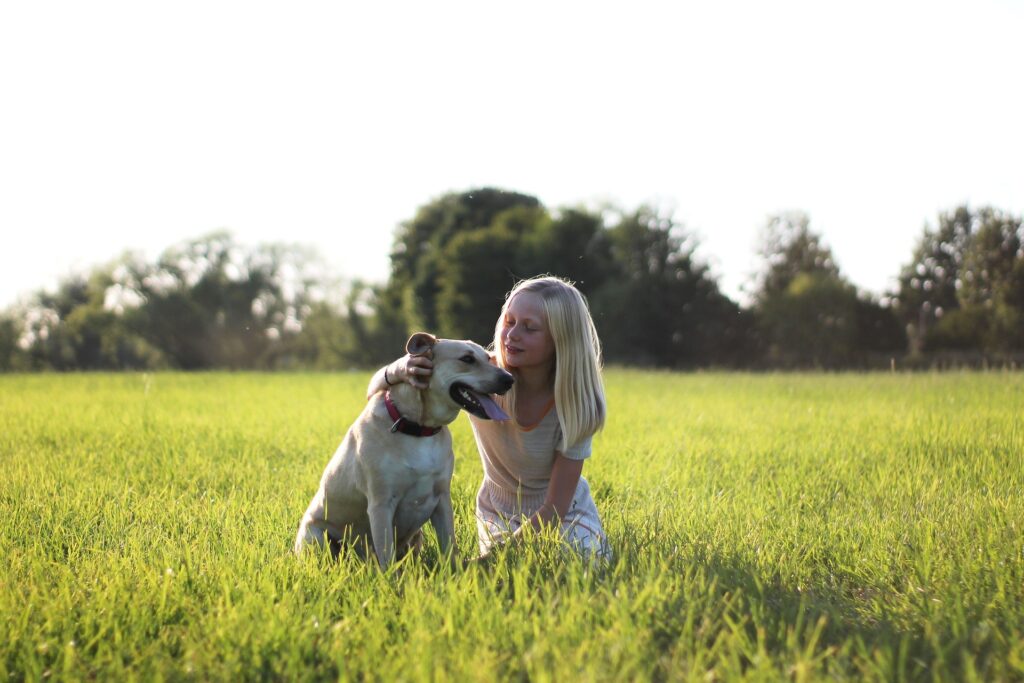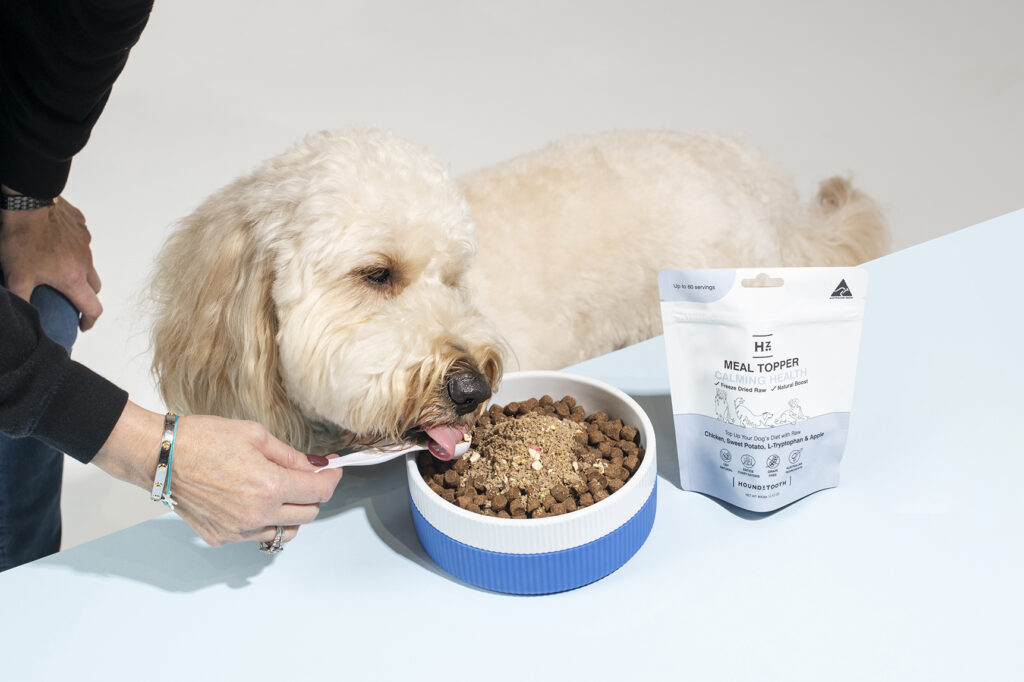Natural calming remedies for anxious dogs
How to calm an anxious dog

No fur parent wants to see their dog distressed, but anxiety is a very real and common emotion in dogs. While these feelings are normal responses to certain triggers, some dogs can get overly reactive to what’s going on around them, which can leave everyone stressed out. So, how can you help your dog with anxiety?
If you’re worried by your dog’s nervous behaviour, read on. The good news is that there is plenty of support (and veterinarian-backed advice) when it comes to natural remedies for dog anxiety. In this guide to helping you calm dog anxiety naturally, we’ll take a look at 7 ways to help soothe their nerves.
What are the signs of anxiety in dogs?
Anxiety can reveal itself in many forms, from low-tucked tail withdrawal to verbal and outwardly aggressive behaviour. So if your lovable pooch has gone from relaxed to highly strung, be on the lookout for these warning signs of stress, fear and anxiety.
- Nervous energy and hyperactivity
- Excessive barking and whining
- Abnormally destructive or aggressive behaviour
- Repetitive digging or paw licking
- Drooling, panting or pacing
- Becoming quiet and withdrawn
- Quivering, cowering or other tense body language
- Low appetite or refusal to eat.
The first step is to look for the signs of stress in a dog, then focus on keeping your pooch relaxed and deciding on positive behaviours for which they should be rewarded (ie not getting overexcited or no longer following you around all the time). You can always have a conversation with your vet if you see these behaviours repeated often.
Potential triggers of dog anxiety
- Strangers, new pet or baby in the home
- Environmental: big noises, storms, crowds
- Moving house or a change in environment
- Car travel or staying with others while you’re away
- Previous trauma or past bad experience
- and the clincher, being left alone
Dealing with separation anxiety
Since the COVID-19 pandemic and all the lockdowns that required working from home, there has been an understandable rise in dog separation anxiety. While we may have been struggling to cope with the isolation, comparatively, our dogs never had it so good! Constant companionship, all those walks to get out of the house – fair enough, it may have come as a rude shock when suddenly we started disappearing each day.
Proper socialisation and good training are both key to relieving separation anxiety, and the extent to which a dog suffers depends on their attachment to their absent caregiver. We recommend gradually getting them used to being alone if your dog is still young. This can help reduce anxiety-related behaviours. Your dog may struggle, but this doesn’t mean they cannot get used to a new routine. Leaving some classical music playing or the TV on can also work. Never ignore your pet, obviously, but it’s a good idea to avoid actually saying goodbye to your dog and try to make your departure as low-key as possible.
7 natural ways to help reduce anxiety in dogs
When it comes to dog anxiety treatment, there are plenty of natural remedies you can try to help puppies and dogs cope with stress. Every dog is unique, so you may need to try a few techniques to help your dog feel better.
1. Exercise is key for energetic dogs
While how much exercise a dog needs depends largely on their age and breed, there’s no doubt that getting outside and going for a walk or playing fetch is great for mental health. A tired dog is usually a more relaxed dog. Try walking twice a day, incorporating at least a loose-lead walk, where they have lots of opportunity to sniff new and different smells. Also mix it up with a new walking route to provide extra stimulation outside of their normal routine.
2. Reassurance and snuggles
Even without anxiety and fear, everyone enjoys the security of a calm place to retreat, and it’s no different for dogs. Make sure they always have access to a quiet and soothing space where they can relax in their bed unhindered by anything else. This can be their safe space to deal with stress and anxiety, and can have a calming effect on dogs. Always reassure your precious pooch with lots of cuddles and attention, and if you need to, turn it up a notch by researching how to give them a massage – the best way to ensure a total bliss-out in a calming environment.
3. Mental stimulation
Dogs are smart. They were pack animals originally bred to perform jobs, so they enjoy some mental stimulation to keep their mind active. Interactive toys, puzzle feeders, frozen treats (where they have to work harder) and training sessions can help distract your dog from their boredom, anxiety and stress, and redirect their focus away from stress and promote relaxation in a rewarding way.
4. Calming treats & supplements
Food is unquestionably powerful when it comes to most dogs. So it makes sense that an all-natural meal topper, such as Calming Health from Houndztooth, would be an easy natural method to help relieve anxiety. With up to 60 servings, this freeze-dried raw single protein topper is a simple way to incorporate some extra soothing nutrition into your dog’s diet in times of stress or anxiety.
Houndztooth’s Calming Health meal topper combines chicken breast, sweet potato and apple with serotonin -boosting ingredients and tummy calming properties such as L-Tryptophan and ginger that may help keep your pooch in optimal calm condition.
Another special Houndztooth supplement to help dogs in their time of need is Hemp Anxiety Aid. This special blend of natural ingredients combines pure Australian hemp seed oil, hemp seed powder, L-Tryptophan, B vitamins, magnesium and green tea. Professionally formulated by our natural animal nutritionist to support the maintenance of your dog’s nervous function, key ingredients also include amino acids, vitamins and minerals such as Vitamin B6, which has a role in normal general metabolism and nervous system function.

5. Establish a routine
Just like children (arguably), doggos love routine! Try to establish a consistent routine, so your dog knows when they should expect attention from you, such as a morning walk before work and mealtimes, and when they should occupy themselves and take a nap (while you’re not home). A routine will help your dog deal with your absence, and they can self-soothe.
6. Natural ways to calm your dog
Music therapy is a relaxation technique that has seen positive results for anxious dogs. But the key is not to have a human voice in there, as it could act as a trigger, contributing to their anxiety. According to the research on Be Chewy, it’s classical music all the way, for its positive impact on dogs.
7. Talk to your Vet
In some cases, you will need to seek advice from an expert, and we always recommend going to your regular vet as the first port of call for this. Your vet will professionally assess your dog and will make recommendations (such as dog anxiety medication). Always consult your vet if you cannot calm your dog naturally.
Can you train stress and anxiety out of a dog?
A professional, such as a vet, will advise on the severity of your dog’s anxiety and what the future options are. We always suggest talking to a professional. With so many different ways anxiety can develop and be triggered, a professional approach for long-term solutions is best.
Everyone wants a happy and stress-free life for their furry friend. But like us, dogs feel stressed or anxious for different reasons and as responsible owners, we want to know how to calm dog anxiety naturally. Whether your dog dislikes loud noises, travelling, suffers from separation anxiety or whines and cries when you leave them alone, feeling calm and relaxed is extremely important to their – and your – overall health.
Browse our products to help with anxiety and stress in dogs. Contact our team if you’re looking for specific dog calming products or treatments for dogs and cats. We’re always happy to help.
